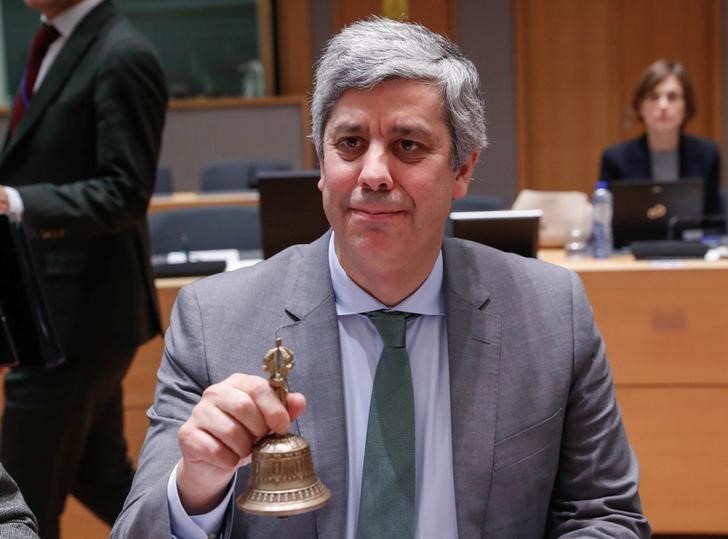 © Reuters. President of the Eurogroup Mario Centeno rings a bell at the start of an eurozone finance ministers meeting in Brussels
© Reuters. President of the Eurogroup Mario Centeno rings a bell at the start of an eurozone finance ministers meeting in BrusselsBy Jan Strupczewski and Francesco Guarascio
BRUSSELS (Reuters) – Euro zone finance ministers will on Monday discuss progress in deepening the integration of their economies, focusing on banking union and the transformation of the ESM bailout fund into a European Monetary Fund, a senior euro zone official said.
The review will allow Mario Centeno, chairman of the ministers’ group, to prepare a report for a euro zone summit on March 23. The leaders plan to take key political decisions on the future shape of the single currency area in June.
The push for deeper euro zone integration gained new momentum after the election in 2017 of French President Emmanuel Macron, who presented an ambitious agenda that also included the creation of a euro zone finance minister and a euro budget.
But with Germany opposed to a separate euro zone budget and a lack of clarity over the role of a euro finance minister, EU leaders have given priority to boosting the powers of the euro zone bailout fund and working on a more stable banking system.
Both reform paths are intended to make the euro more resilient to financial shocks.
Apart from a new name, the European Stability Mechanism (ESM) is to get greater powers to monitor the economies of countries that ask for its help, so that it can manage future bailouts without the participation of the International Monetary Fund or the European Central Bank.
Crucially, it is to play a role in the possible debt restructuring of countries that ask for a bailout. Germany would like such a restructuring to happen automatically when a government loses market access, but others, like highly indebted Italy, are against, fearing market panic.
The ESM is also to become a financial backstop to the Single Resolution Fund (SRF), which finances the winding-down of failed banks and is financed from accruing bank contributions.
These could, however, prove to be insufficient in a major crisis. So to give the SRF all the firepower it needs, the ESM could lend to it in an emergency and get its money back later.
“We are working on all of it, technically, very hard, in subcommittees. It is much too early to draw conclusions on this,” the senior euro zone official said.
The euro zone also wants to complete its banking union, by creating a euro zone-wide deposit insurance scheme which would boost the confidence of savers in banks and protect deposits of up to 100,000 euros in any euro zone bank.
But Germany, Denmark, Estonia, Finland, Ireland, Latvia, Lithuania, the Netherlands and Sweden say that before work on such a deposit insurance scheme can start, euro zone banks have to reduce their exposure to risks.
“There is consensus we should measure how far we have moved in risk reduction, it is discussed now how to measure that,” the official said.
“It is not clear right now what we are going to take into account. We will get a result on this but not now, this will take some time.”
Other issues for the completion of the banking union include how banks should provision for bad loans and whether to set limits on banks’ holdings of securities of a single government.
The ministers are also likely to talk about the idea of a fiscal capacity for the euro zone, the official said, but added that this discussion went hand in hand with talks on better fiscal discipline of euro zone governments.
Source: Investing.com





























